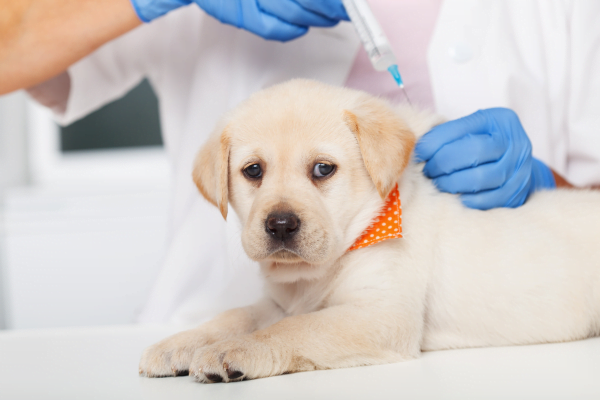The first health care decision one takes after bringing a dear puppy home is the vaccination schedule. Many of the endemic diseases can be prevented with vaccination or medication. A vaccine contains antigens which helps to stimulate a response in the immune system by protecting your furry friend against future exposure to disease. Vaccination for pets and humans are very similar in terms of vaccinations put for humans. They play a crucial role in protecting our little paws from harmful canine diseases. Vaccines go through strict checks for quality, safety and effectiveness. A veterinarian helps inject vaccines.
Vaccines available for canine related diseases
- Canine distemper virus (CDV)
- Canine parvovirus (CPV)
- Canine adenovirus (CAV)
- Canine leptospira
- Canine parainfluenza virus (CPi)
- Bordetella bronchiseptica (Kennel cough)
- Canine rabies
However not all vaccinations are necessary and may be purely based on regional government requirements. The primary inoculations which have been suggested essential for all pets are –
- Canine distemper virus (CDV)
- Canine parvovirus (CPV)
- Canine adenovirus (CAV)
- Canine leptospira
The administration of other vaccines such as Leptospira, coronavirus, giardia, bordetella, parainfluenza and Lyme disease must be limited to booster doses of certain vaccinations that provide longer duration of protection for your pet from diseases. However, careful discretion should be taken by your veterinarian since not all vaccines need to be given unless there is potential contact with the disease. For example – veterinarians stopped giving leptospirosis since it led to many allergic reactions and a new strain of vaccine was invented for this issue.
A sample vaccination schedule
- Bordetella – This is an optional vaccine given for kennel cough, annually or as need arises.
- Lyme disease – This vaccine can be given at the onset of tick season or pets in high exposure areas.
- Canine adenovirus – Vaccination helps protect against upper respiratory tract infections. Vaccination is recommended once during your pet’s first year of life and then booster dose is once every 3 years. It also helps protect against Adenovirus -1.
- Canine distemper – It is a multisystemic disease of viral origin with yearly booster doses post the first vaccination.
- Canine parvovirus – Parvovirus affects the lining of the digestive system. It necessitates the need to take booster doses every year post the initial dose and revaccination every 3 years.
- Leptospirosis – Leptospirosis affects the Kidney or Liver. This is an optional vaccine which requires revaccination every 6 months in high risk situations. The booster dose can be delayed or stopped when exposure is minimal.
- Parainfluenza – This strain also causes a type of kennel cough. Booster dose is required once a year and revaccination every 3 years.
- Rabies – Rabies virus affects the brain and spinal cord. Booster dose is required one a year and revaccination every 3 years as per the government regulations.
Puppies and vaccinations
No vaccine is 100% effective everytime. Especially in puppies, the immune response may affect the health and level of maternal antibodies in the body. If a puppy is exposed to any virus before vaccination or at the same time of vaccination, the vaccine loses its potency and fails. This could be because of – stress, poor nutrition etc.
Puppies receive a certain degree of natural immunity to disease from their mother’s rich colostrum milk. However, the concentration reduces from the second or third day of feeding. This is called passive or maternal immunity. The protection subsides slowly by 75% by the second week of the puppy’s life and may lose the passive immunity completely by 14-16 weeks of life.
This is the reason why timely vaccination for puppies is a serious concern.
Vaccination – advantages and disadvantages
Pros of vaccination
- Helps keep diseases at bay – Vaccines are a proven measure to protect your pet from infections and diseases which are debilitating. This also ensures infection is not spread from pet to pet or even to humans.
- Reduced health care expenses – Periodic and systematic vaccines can help save healthcare costs in the long run.
- Better public health – Vaccinating your pet can help avoid disease transmission in terms of zoonotic infections.
- Relaxed life – You can live with the peace of mind that your pet is protected from common diseases and have a lot of fun socialising and visiting new locations.
Cons of vaccination
- Possible side effects – There may be minor side effects which may arise such as fatigue, allergic reactions, low grade fever etc. which may be a temporary hassle.
- Occasional allergic reactions – There are several components used to manufacture the vaccine. There is always a slight possibility that your pet is allergic to one or more of the ingredients present in the vaccine. This is usually rare but requires immediate veterinary attention.
- Overdose of vaccination – There may be the possibility of overdose of vaccination due to medical negligence as not all pets require annual booster doses for all diseases.
- Expense – Vaccinations are very expensive and add to the yearly pet health care cost. However, it is lesser in terms of cost when compared to disease or hospitalisation costs.
Weighing pros and cons
Vaccinations are safe in general however, they are not void of any risk. Certain breeds at high risk of possible adverse reactions are –
- Miniature Dachshunds
- West Highland high terriers
- Old English Sheepdogs
- Akitas
- Weimaraners
- Dogs with coat colour dilutions ( E.g. Great Danes, Irish Setter)
Rather than steering clear of vaccinations altogether, you can choose a suitable vaccination schedule. Such as a triennial (once in 3 years) vaccination schedule after you celebrate your furry baby’s first birthday.
You may consider speaking to your veterinarian to choose a suitable vaccination schedule.
Most Veterinary associations such as the American Animal Hospital Association recommend a 2 or 3 shot series (dispersed 3 to 4 weeks apart) of vaccinations especially for puppies.
A titer test to assess if a booster dose is essential to estimate if a booster dose is imperative. The titer measures antibody concentration of an antibody in the blood serum.
Some regions have higher incidence of particular infections such as parvovirus, hence the decision of frequent vaccination or not is completely dependent on your veterinarian’s point of view and it is best to follow their advice.
Mayuri,
Clinical Dietitian, Simplyweight













